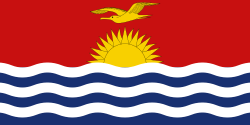Coat of arms of Kiribati
| National Emblem of Kiribati | |
|---|---|
 | |
| Versions | |
 The banner of arms, which serves as national flag | |
| Armiger | Republic of Kiribati |
| Shield | Gules, issuant from a base barry wavy Argent and Azure, a Sun in Splendour Or, in chief a Frigatebird volant Or. |
| Motto | Te Mauri te Raoi ao te Tabomoa (lit. 'Health, Peace and Prosperity') |
The coat of arms of Kiribati, officially known as the National Emblem of Kiribati, is the heraldic symbol representing the Central Pacific island nation of Kiribati. The arms feature a golden-coloured lesser frigatebird[a] over a rising sun on a red background among white and blue stripes (symbol of the Pacific) and the 3 pairs of stripes represent the three archipelagos of the nation (Gilbert, Phoenix and Line Islands). The 17 rays of the sun represent the 16 Gilbert Islands and Banaba (former Ocean Island). On the ribbon under the shield is the Gilbertese motto Te Mauri te Raoi ao te Tabomoa (Health, Peace, and Prosperity).
History
[edit]
After being drawn by Sir Arthur Grimble in 1932, the coat of arms was granted by the College of Arms on 1 May 1937 to the Gilbert and Ellice Islands, then British Colony, which paid £25 for it, and was adapted as the official coat of arms of Kiribati in 1979 with the new motto. The design was partially inspired by the flag of the Company of Scotland.[2] The previous motto of the British Colony (1937–1979) was "Fear God, Honour the King" (both in Gilbertese, Maaka te Atua, Karinea te Uea; or Tuvaluan, Mataku i te Atua, Fakamamalu ki te Tupu).
The same motif is seen on the flag of Kiribati.
Notes
[edit]References
[edit]- ^ "Kiribati". www.hubert-herald.nl.
- ^ "Kiribati". www.hubert-herald.nl.
Sources
[edit]- Minahan, James, 2010: The Complete Guide to National Symbols and Emblems (2 vols); Kiribati: p 79 (text;Googlebooks) and p 282 (image; Googlebooks) ABC-CLIO LLC. ISBN 978-0-313-34496-1
- Heraldry of the World: Kiribati
- http://www.paclii.org/ki/legis/num_act/nia1989197.pdf
